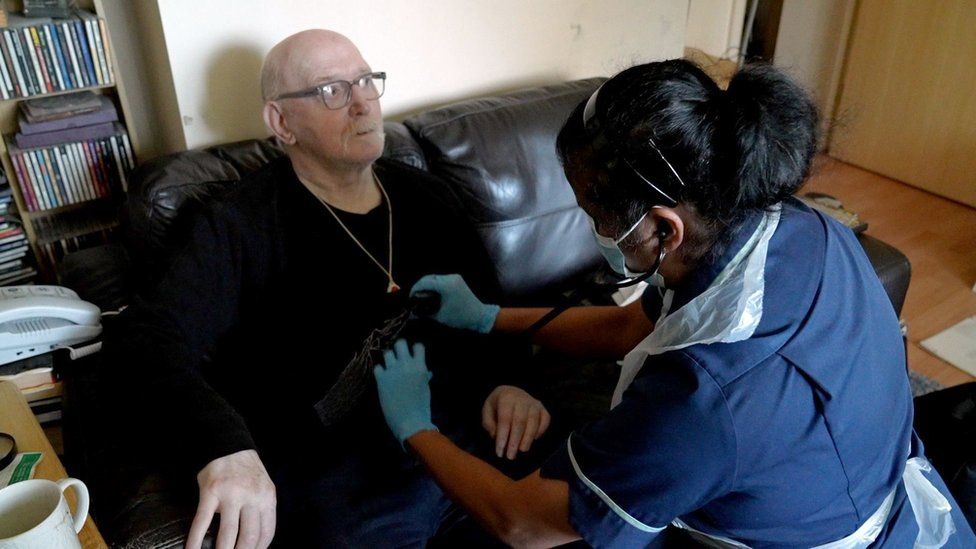ARTICLE AD BOX

Manju checks Steven after his fall
By Dominic Hughes
Health correspondent, BBC News
As the pressures of winter and the Covid treatment backlog grow, the NHS is struggling. In Manchester, one organisation is pioneering a new way to care for people that tries to reduce the burden on the health service.
It's the first call-out of the day for nurse Manju and pharmacist Kara in north Manchester.
They are on their way to see Steven, who has been diagnosed with Parkinson's disease and had a fall the previous night.
This might have led to a call-out for an ambulance crew and a visit to A&E. But instead the Manchester Local Care Organisation (LCO) stepped in.
Once at Steven's house, Manju makes sure he hasn't been harmed by his fall, while Kara checks his medication.
Manju notes that Steven's tablets could have contributed to his fall.
"We noticed that there were side-effects, which caused him to be drowsy. It's something he's aware of, particularly when you combine certain medications for pain.
"And when he walked at the same time, that drowsiness made him have that fall. He's now aware after counselling of what precautions he can take in future."
Manju asks Steven how he copes going up and down the stairs.
"I'm OK, just about," he says. But when he has a go at coming down the stairs, Manju spots he could use an extra grab rail and says she will sort one out.
This intervention by the team has not only avoided Steven ending up in A&E, but also ensures he can continue to live independently in his own home.
Lana McEwan's mission is to keep patients out of A&E if that isn't the best option for them
That's a key part of the LCO mission, according to Lana McEwan, one of the team leaders in north Manchester.
"We would consider ourselves to be an admission-avoidance service, so we're trying to prevent ambulances being called in the first instance.
"When an ambulance has been called, we're taking referrals directly from the ambulance service and responding within a one or two-hour response depending on need, and that's an alternative to A&E."
Local neighbourhood teams are made up of nurses, social workers, pharmacists and doctors, all working together to keep people out of hospital.
In south Manchester, team leader Annabel Hammond says that each month they look after around 650 people - supporting them to stay safe at home and out of hospital.
"It's a huge benefit for the people that are out there, that are able to enjoy life with their friends and family, rather than having to go to hospital, she says. "And they might end up taking a while to leave hospital because of the challenges that exist around social care."
Staying in the community
A couple of miles up the road, in Moss Side, Eric and his dog Maisy are enjoying life in their new flat. Eric is lucky to still be with us.
Last year he slipped in the shower at his old house and was stuck there for five days, until he was rescued by the fire service.
The LCO found Eric a new flat, just down the road from where he used to live, keeping him in touch with the community he's known for all of his 78 years.
There is on-site care should he need it, but importantly for Eric, this is very much not a care home: "I'd sooner live in a tent than go in a care home."
Eric is happy not to be moved to a care home
Eric is laughing as he says this, obviously enjoying the chance to sell the benefits of his new flat.
"Instead of the traditional nursing home, which is like God's waiting room - you get shoved in, nobody visits you, nothing happens and you just wait for death. I don't believe in waiting for death."
Part of this purpose-built development is also dedicated to helping people get discharged from hospital.
Apartments are offered to those well enough to leave hospital, but who still need some care. The flats are specially designed - for example, they have wider doorways to accommodate wheelchairs.
Residents get regular visits from the community nursing team, and movement and fall sensors help ensure that people stay safe.
Complete integration
To make the LCO work, Manchester city council and the local NHS have had to integrate their services completely - a single budget, with no demarcation between health and social care.
Chief executive Katy Calvin-Thomas says the help offered is targeted at each individual patient: "We look at a person and what they are presenting with, and we work with them to decide what support they need.
"And then, as the Local Care Organisation, we've got loads of resources at our disposal to wrap around that person, to get them to be the best that they can be, living in their own home, in their own community, wherever possible.
"What it provides is a real community offer, that's able to pull and support people to come out of hospital as soon as they're ready.
"We can make real inroads into some of those pressures the NHS is experiencing."
Working together to deliver care at home and avoid visits to hospital - this all sounds simple.
But it could be the key to keeping the NHS going through some tough months ahead.

 2 years ago
69
2 years ago
69








 English (US) ·
English (US) ·